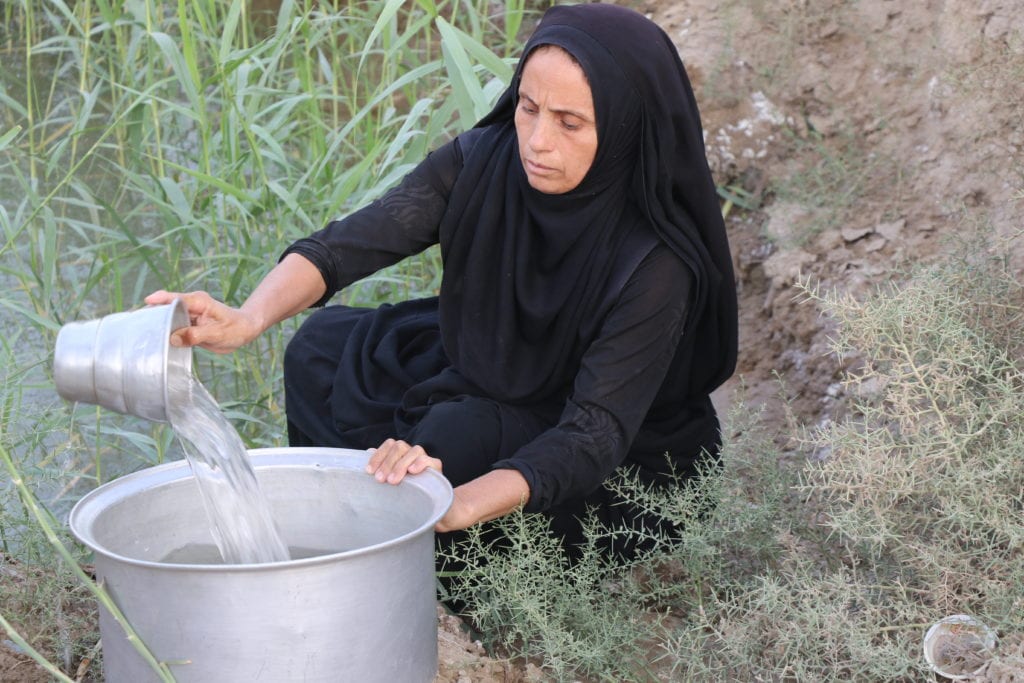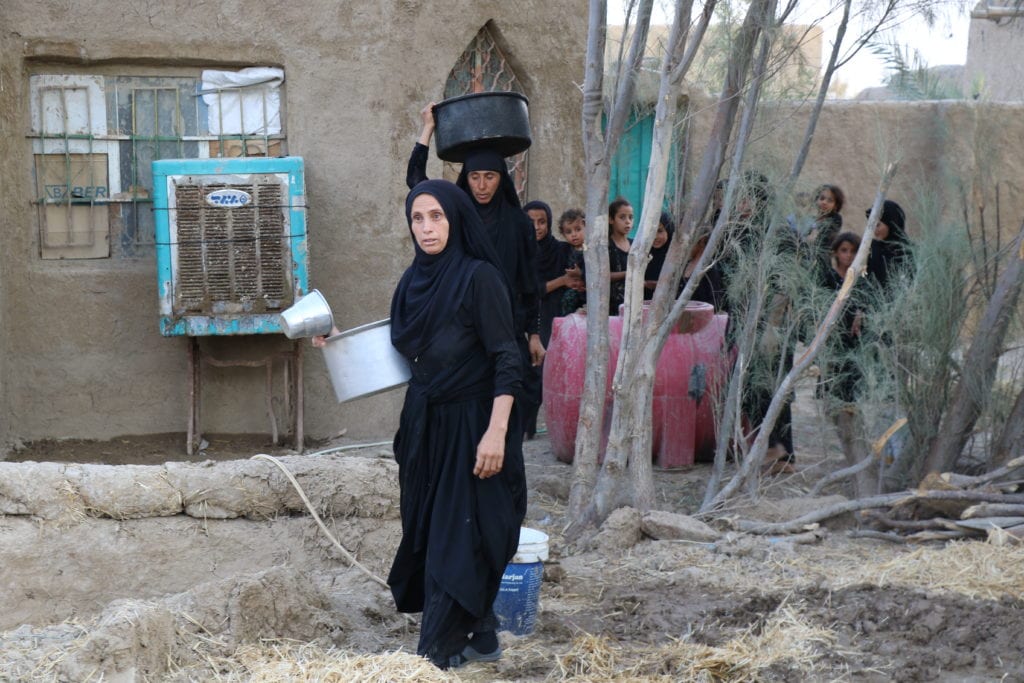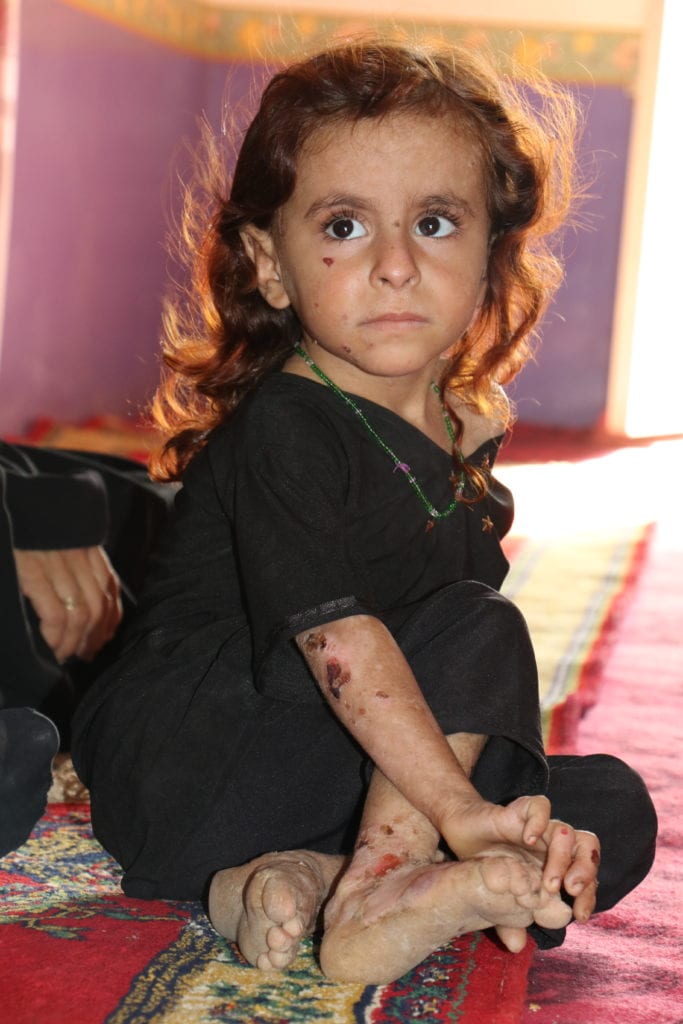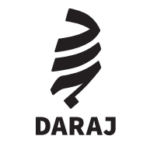Draught and polluted water devastate the women of Alboroeishid village and other villages southern Iraq, whereas silence prevails in encountering diseases. Um Ali (35 years old) and other women in the Alboroeishid village walk bout three kilometers en route to clean water and the same distance back home. Each one of them carries a big pot on her head and walks to the nearest rivulet of water every dawn. They have to walk the same way again at noon and return, and again before sunset, they do the same task to get some water that can be used for household purposes and to wash their kids. Those women work in shifts to get water from the rivulet or bathe in it without using soap, which does not make foam because of high water salinity. Additionally, water is not sufficient for everyday activities in the village, so women usually sit on the stream bank, which is locally called Al-Broksiyah, and wash their dishes while other women take turns to cover each other with their Abayas (garments) to have a bath in the river to save the water they carry home. Um Ali Alboroeishid village belongs to Al-Bdeir District in Diwaniyah province (200 kilometers southern Baghdad), and about 700 people live there; most of them are women and children. Houses and silos are built of clay and hay by the hands of women and girls, while men provide drinking water they get from Al-Bdeir District, about 60 kilometers away. Um Ali and the rest of the women in the village are afraid to have babies because of the spread of genetic deformities among newborns and the blisters on the skin of their older children. The pain caused by these blisters keeps mothers awake all night because of the crying of their children. The villagers think that the cause is the salty Sulphur water, which is the only water source they have due to drought and scarcity. Women are characterized by dark complexion and severe thinness, along with the features of poverty. This is due to the decrease in rainfall and high temperature, which led to the diminishing of river water and groundwater, and the loss of the economic sources of farming and livestock. Turki Abood (60 years old) says: “We are destroyed by drought and water scarcity.” This man used to own 120 heads of livestock (cattle, sheep, and chickens) most of which died of thirst or because of the water in the salty wells. Today, he is left with only six thin sheep, two chickens and a rooster. Sallal Al-Bdeiri, the village mayor, states that most problems of the villagers come from water scarcity and lack of farming and animal breeding, and they have to dig wells which give only Sulphur salty water. Lab tests confirm that underground water is not suitable for drinking, irrigation, nor other uses. The water purification plant lies in the village center, but it is out of service though it only needs simple repairs to provide potable water to save the villagers from polluted water. Draught and polluted water are killing Alboroeishid village, and other villages south of Iraq and silence prevailed in the face of diseases Another danger threatens girls in the villages with scarce water sources and a lack of hygienic baths. They report that they have to go out in the dark at night to answer the call of nature, and they have to keep the lights in their cellphones up to avoid snakes, scorpions, and other insects. Um Ali and her four daughters fear from wild boars, foxes and wolves which roam the village at night spreading fear among people. Dr. Asaad Al-Fatlawi, dermatologist, does not exclude polluted water and the general environment from the causes of diseases among children. Kareema Al-Taii, the activist, points out that skin diseases, respiratory, and glandular infections are spread in Al-Bdeir district because of water pollution. She performed community programs about drought and climate change targeting women. Staying up all night to condole kids with Pemphigus, providing water for the family, and performing daily works of cleaning, building, and repairing does not give Um Ali a chance to manage the cost of medication for the kids. In short, draught and polluted water are killing Alboroeishid village, and other villages south of Iraq and silence prevailed in the face of diseases. Noteworthy, Pemphigus is one of the rare immunity diseases, and skin blisters manifest it. It is a disease that attacks people over 40 in particular, and the blisters spread in various parts of the body like the head, face, eyes, and nasal cavities. Current statistics point out that the infection rate is between 0.4 and 3.4 per 100000 of the world population. It causes several physical and psychological symptoms and can lead to death in about 7-16% of the cases. The blisters occupy extensive areas in the skin and cause sores, body fluid loss and vulnerability to severe bacterial and viral complications. * This story was written as part of a project by Internews Organization to train journalists on writing and producing stories about sensitive issues related to gender in Iraq.
Draught
and polluted water devastate the women of Alboroeishid village and other
villages southern Iraq, whereas silence prevails in encountering diseases.
Um Ali
(35 years old) and other women in the Alboroeishid village walk bout three
kilometers en route to clean water and the same distance back home. Each one of
them carries a big pot on her head and walks to the nearest rivulet of water every
dawn. They have to walk the same way again at noon and return, and again before
sunset, they do the same task to get some water that can be used for household purposes
and to wash their kids.
Those
women work in shifts to get water from the rivulet or bathe in it without using
soap, which does not make foam because of high water salinity. Additionally,
water is not sufficient for everyday activities in the village, so women
usually sit on the stream bank, which is locally called Al-Broksiyah, and wash
their dishes while other women take turns to cover each other with their Abayas
(garments) to have a bath in the river to save the water they carry home.
Um Ali
Alboroeishid
village belongs to Al-Bdeir District in Diwaniyah province (200 kilometers
southern Baghdad), and about 700 people live there; most of them are women and
children. Houses and silos are built of clay and hay by the hands of women and
girls, while men provide drinking water they get from Al-Bdeir District, about
60 kilometers away.
Um Ali
and the rest of the women in the village are afraid to have babies because of
the spread of genetic deformities among newborns and the blisters on the skin
of their older children. The pain caused by these blisters keeps mothers awake
all night because of the crying of their children. The villagers think that the
cause is the salty Sulphur water, which is the only water source they have due
to drought and scarcity.
Women
are characterized by dark complexion and severe thinness, along with the features of poverty. This is
due to the decrease in rainfall and high temperature, which led to the diminishing
of river water and groundwater, and the loss of the economic sources of farming
and livestock.
Turki Abood (60 years old) says: “We are destroyed by
drought and water scarcity.” This man used to own 120 heads of livestock
(cattle, sheep, and chickens) most of which died of thirst or because of the
water in the salty wells. Today, he is left with only six thin sheep, two
chickens and a rooster.
Sallal Al-Bdeiri, the village mayor, states that most
problems of the villagers come from water scarcity and lack of farming and
animal breeding, and they have to dig wells which give only Sulphur salty
water.
Lab tests confirm that underground water is not
suitable for drinking, irrigation, nor other uses. The water purification plant
lies in the village center, but it is out of service though it only needs
simple repairs to provide potable water to save the villagers from polluted
water.
Draught and polluted water are killing Alboroeishid village, and other villages south of Iraq and silence prevailed in the face of diseases
Another danger threatens girls in the villages with
scarce water sources and a lack of hygienic baths. They report that they have
to go out in the dark at night to answer the call of nature, and they have to
keep the lights in their cellphones up to avoid snakes, scorpions, and other insects.
Um Ali and her four daughters fear from wild boars, foxes and wolves which roam
the village at night spreading fear among people.
Dr. Asaad Al-Fatlawi, dermatologist, does not exclude
polluted water and the general environment from the causes of diseases among
children.
Kareema Al-Taii, the activist, points out that skin
diseases, respiratory, and glandular infections are spread in Al-Bdeir district
because of water pollution. She performed community programs about drought and
climate change targeting women.
Staying up all night to condole kids with Pemphigus, providing water for the family, and
performing daily works of cleaning, building, and repairing does not give Um
Ali a chance to manage the cost of medication for the kids.
In short, draught
and polluted water are killing Alboroeishid village, and other villages south
of Iraq and silence prevailed in the face of diseases.
Noteworthy,
Pemphigus is one of the rare immunity
diseases, and skin blisters manifest it. It is a disease that attacks people
over 40 in particular, and the blisters spread in various parts of the body
like the head, face, eyes, and nasal cavities. Current statistics point out
that the infection rate is between 0.4 and 3.4 per 100000 of the world
population. It causes several physical and psychological symptoms and can lead
to death in about 7-16% of the cases. The blisters occupy extensive areas in
the skin and cause sores, body fluid loss and vulnerability to severe bacterial and viral
complications.
* This story was written as part of a project by Internews
Organization to train journalists on writing and producing stories about
sensitive issues related to gender in Iraq.











